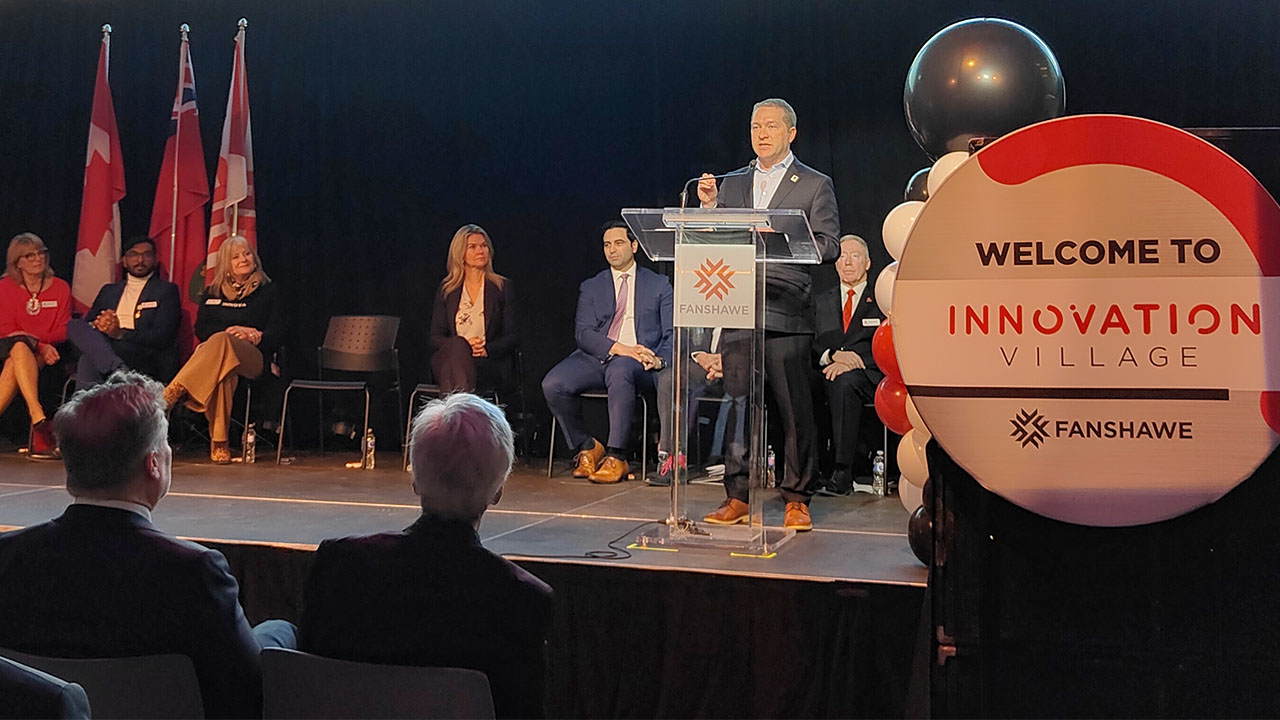College, local reps respond to international study permit cap
 CREDIT: ANGELA VARGHESE
CREDIT: ANGELA VARGHESESeveral local politicians including London Mayor Josh Morgan (pictured) and Fanshawe executives spoke on the cap on international students at the opening of Innovation Village.
Immigration Minister Marc Miller has announced that the federal government will introduce a temporary, two-year cap on new international student permits. A cap of 364,000 approved study permits will be introduced, representing a 35 per cent reduction from 2023. The cap will be allocated by province based on population, meaning some provinces may see more significant decreases than others. The provinces and territories will work together to determine how the cap is distributed among the designated learning institutions under their jurisdiction.
Miller has suggested in recent months that the influx of international students in Canada is contributing to the country’s housing shortage. More than 800,000 international students were issued temporary study visas in 2022, and Miller said last fall the numbers were tracking to hit 900,000 in 2023.
Miller also announced two additional measures in an effort to ensure what he called, “quality education for future students” coming to Canada.
Starting Sept. 1, Miller said that the government will stop issuing postgraduate work permits to international students who graduate from “public-private institution models.” Additionally, in the coming weeks, Miller said the government will be announcing that open work permits will only be available to spouses of international students enrolled in master’s and doctoral programs, as well as professional programs such as medicine and law.
“Spouses of international students enrolled in other levels of study, including undergraduate and college programs, will no longer be eligible,” Miller said.
It’s important to note that the cap will not apply to applicants within Canada who are looking to extend their studies, as, according to Miller, “it wouldn’t be fair to prevent someone from finishing the program.” Furthermore, the cap will not affect study permit holders currently in Canada.
These temporary measures will be in place for two years, and the number of new study permit applications accepted in 2025 will be reassessed at the end of this year. Before ending the press conference, Miller emphasized that these measures are not meant to hurt international students.
At the grand opening of Innovation Village on Jan. 26, the question of the cap loomed over the events of the day, as federal representatives visited the college and Fanshawe president Peter Devlin acknowledge the various unknowns regarding the cap.
“We just sent out a message to students because this announcement was a surprise and a tremendous disappointment,” Devlin said. “We will ensure that students, prospective students, the Fanshawe College faculty and staff, and our community are aware.”
The message to students was sent via email on Jan. 22 by Fanshawe College on behalf of the Vice President of Student Services, Michele Beaudoin.
“We are still reviewing the announcement and its impact on Fanshawe. Our focus remains on providing an exceptional educational experience for all our students,” Beaudoin said in the email.
Beaudoin ended the message by saying, “We recognize a lot of uncertainty surrounding what these changes mean, but we know that your learning experience, safety and well-being are paramount. We will continue to provide further information as we learn more.”
Devlin stressed peace of mind for students who have already received work permits and study visas, stating they should not worry.
Fanshawe Student Union (FSU) president Stephin Sathya also emphasized that “current study permit holders will not be affected. So they will still be able to get their PWP [Post-Graduation Work Permit]. [This announcement] is for people studying starting Sept. 1 this year.” Even though there will be a substantial decrease in the number of students in Canada, Sathya clarified that “the extent of the impact on individual universities and programs remains uncertain until the provincial government finalizes implementation of the cap.”
Member of Parliament for North Central London, Peter Fragiskatos also attended the opening of Innovation Village. Fragiskatos said the government’s decision was made in an effort to cope with the social and economic challenges of integrating international students, which he said the colleges are particularly responsible for.
“This does not mean that we don’t want to continue to work with Fanshawe and appreciate the work that Fanshawe does. It’s up to the provincial government to look at that gap and how visas will be allocated within it,” Fragiskatos said.














